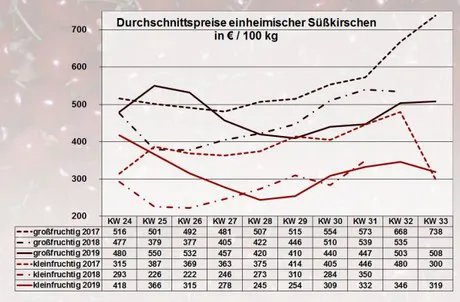The local cherry campaign is nearing completion. The availability was massively limited and the quality was not always right. Despite the limited supply situation, demand could be satisfied, as it was not particularly pronounced. In Munich, demand was not by incoming shipments but with the standing inventory. Larger products were still the most popular among customers, with little demand for the smaller ones - under 28 mm.
Domestic offers formed the basis of the range of goods, Turkish ones complemented them. The Netherlands, Belgium and Poland only locally had a complementing character. In Frankfurt, Canadian imports appeared, but at €16 to 18 per kg, however, these were clearly too expensive and therefore could hardly be accommodated. Furthermore, additional fruit from Switzerland was only very hesitantly being sold at € 6.50 per kg in Berlin. 
Apples
The season of the European lots was gaining more and more momentum. Above all, German batches - mainly Delbarestival and Elstar - gained in importance.
Pears
Italian and Turkish Santa Maria and French Dr. Jules Guyot formed the basis of the assortment. Behind these followed the Spanish Limoneras and Chilean Abate Fetels.
Table grapes
In general, demand was quite nice. Nevertheless, as a result of the expanded offer, prices had to be reduced several times.
Apricots
France dominated events, before Turkey and Spain. Supply was limited. But demand also diminished. The quality of the offers did not always convince the customer.
Peaches and nectarines
There was little business going on here. The focus was on yellow-fleshed fruits of larger calibres. Supply and demand were mostly in sync.
Plums
The offer grew: domestic President, Auerbacher, Chrudimer and Cacaks Fruchtbare joined established other domestic varieties such as Cacaks Schöne, Hanita and Top.
Lemons
Spain was more present than Argentina or South Africa. The business was rather uneven and prices developed accordingly.
Bananas
The demand was quite restrained. Due to the holidays, business was quite relaxed. Third-party brands were best placed locally because of their low prices.
Cauliflower
German offers dominated events almost monopolistically. Belgium supplemented the market. The supplies were apparently limited.
Lettuce
Regarding lettuce, Germany dominated ahead of Belgium and the Netherlands. Availability was limited, but sufficient to meet demand. Demand was not particularly strong.
Cucumbers
The assortment consisted of native, Belgian and Dutch shipments, all together. The high prices of the previous week crumbled in some places, but this did not necessarily accelerate the sales.
Tomatoes
The offers diminished. Belgium and the Netherlands prevailed. Germany and Italy had more complementary character. The trade was uneven.
Sweet peppers
The Netherlands dominated the events. Sales showed a certain continuity, but no special highlights. Prices developed very differently.
Source: BLE
